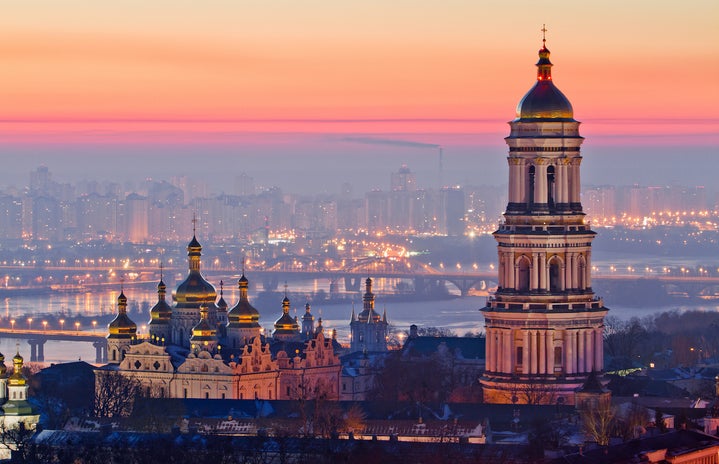On February 24, Russian president Vladimir Putin launched an attack on Ukraine in what the Associated Press referred to as “the largest ground war in Europe in decades.” Russian forces invaded Ukraine from the north, east, and south in a three-pronged approach, hours after Putin announced a “special military operation” that he claimed was for the “demilitarization and denazification” of Ukraine, according to the Guardian, which also pointed out that the narrative of Ukraine’s nazism was false propaganda.
Russia and Ukraine have had tensions for years, as Ukraine was previously part of the Soviet Union and Putin has opposed Ukraine’s independent existence. Ukraine’s interest in joining NATO (the North Atlantic Treaty Organization), according to NDTV, angered Russia and led tensions to boil over.
Now, the future is uncertain for many Ukrainians — over 40 soldiers have already died, and many civilians are attempting to flee for their safety. While the attacks continue and world leaders from other countries respond to the crisis, there are ways that you can help Ukrainian citizens in the meantime.
Donate money for medical supplies.
As reported by Fast Company, Ukrainians have created a list of verified organizations that people can donate to out of support. With the physical safety of Ukrainians at risk, medical supplies are in high demand. Nonprofits Razom for Ukraine, United Help Ukraine, and Sunflower of Peace have started fundraisers on Facebook and are accepting donations to be put toward first aid kits, backpacks with emergency medical supplies, and other medical aid for people in Ukraine. You can also donate to Revived Soldiers Ukraine, another nonprofit which focuses on the medical rehabilitation of Ukrainian soldiers.
Donate to children affected by the war.
Voices of Children provides “psychological and psychosocial support to children” who are affected by the war, according to their website. Their services include art therapy, mobile psychologists, individual help, and video storytelling.
Donate to independent Ukrainian English-language journalism.
The Kyiv Independent is a Ukrainian English-language media outlet, and is one of the primary sources for getting updates on the situation from Ukraine without propaganda. You can donate directly to the organization through Patreon or GoFundMe.
Donate directly to Ukrainian individuals.
If you’re staying up to date on social media, you might come across Ukrainians asking for money directly, for their families or their own safety. This can be one of the fastest ways to get your donation to people in Ukraine and see it make a tangible difference — just be careful that you’re not giving it out to suspicious or fake accounts. Some people have flagged online that PayPal is not available in Ukraine, but someone asking for donations through PayPal isn’t necessarily a sign that they’re a scam. They might have loved ones in places where PayPal is accepted that can then directly transfer money to them, as one Twitter user pointed out. Use your best judgment and always do research into where you’re giving money.
Spread awareness, but not misinformation.
With our access to social media and the often unregulated flow of news and updates, it can be easy to accidentally retweet or share a piece of information that later turns out to be false. Doing so can spread panic, create confusion, and may amplify dangerous sources. Rather than immediately resharing any claim or link that comes your way, always make sure to check the source of information and verify that it’s true. Read articles from reputable publications — The New York Times, CNN, and The Associated Press are providing live updates.
Of course, social media will present new developments the quickest, so when you’re on there, stick to credible sources and know how to spot fake ones. Journalist Josh Marshall created a Twitter list of reputable journalists, commentators, and analysts who are reporting on the Ukraine crisis in live time, so you can stay up to date without getting misinformed. Sean Keane from CNET has also created a curated list of experts to follow, as has NBC News politics reporter Rebecca Shabad.


